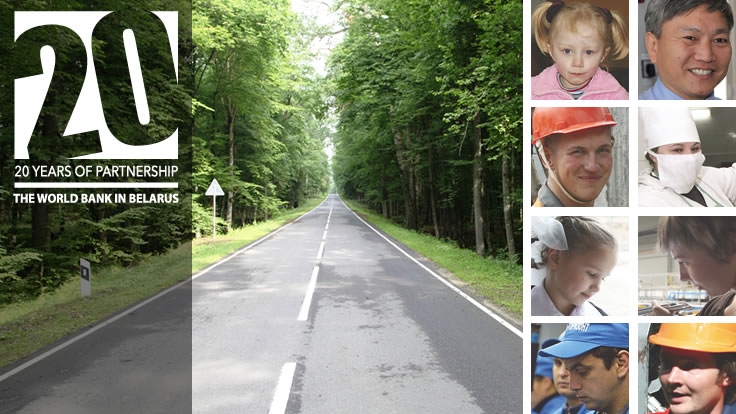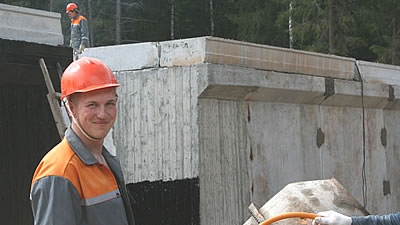Helping Poor and Vulnerable People
Unified Targeted Social Assistance System (2003) replaced 200 poorly targeted privilege-based types of social benefits with targeted assistance to the poor and vulnerable.
Warmer Schools and Hospitals with Less Energy
1,000 schools, hospitals, and kindergartens benefitted from construction of new boiler houses and replacement of windows, doors, and lighting fixtures. The average indoor temperature increased to an acceptable level; school absences related to sickness were reduced.
The average electricity savings amounted to 55%, while heat savings amounted to 15%. Reduction of CO2 emissions attributed to heat and electricity generation is 70,000 tons per year.
Better Public Finance Management
Treasury was established (1993) with Bank support. Following recommendations of Public Expenditure and Institutional Review (2003) the Government undertook significant steps towards budget consolidation, e.g., incorporating major off-budget funds into the budget, expanding Treasury coverage, and improving budget classification.
Developing Evidencebased Statistics
The World Bank supported preparation of the National Strategy for Development of Statistics and establishment of two regular household surveys – Household Budget Survey (1995) and Labor Force Survey (2012) – consistent with international methodology.
Supporting Structural Reforms
A Development Policy Loan (2010) and policy advice facilitated structural reforms to support further price liberalization, reduction of entry costs for new businesses, as well as reduction of regulatory and administrative operation costs for the private sector, lower subsidies, and elimination of inefficient taxes. As a result, Belarus reduced the number of annual payments from 125 in 2005 to 10 in 2011, time to pay taxes from 987 hours a year to 338, and total tax rate from 137.5% of profit to 60.7%.
Better Forestry Management
With Bank support, productivity of forests planted with seeds from the Seed Selection Center established in 2002 is 20% higher than using the traditional methods. 500 professionals were trained in intensive silviculture in 1997.
Addressing Environmental Concerns
With Bank Financing, Analytical Work and Technical Assistance 1,800 tons of persistent organic pollutants stockpiles were eliminated in 2012. A System of Integrated Environmental Permitting contributing to the reduction of emissions and pollution was designed and the first National Inventory of Greenhouse Gas Sources and Sinks was prepared. The Government used a new approach to Chernobyl-affected regions with economic development as a key priority.
Supporting Communities and Citizens' Engagement
85 civil society initiatives have received Bank grant support to implement small projects that promote development, dialogue, and cooperation at the community level.
Sharing Global Knowledge
Through its analytical and advisory activities the Bank shares it global development knowledge with Belarus. For example, Country Economic Memorandums – the Bank's core diagnostic reports on the country economic performance – were prepared in 1996, 2005, and 2012. The most recent report reviews the country's development in the past decade, making the case for a new growth strategy.
The first volume of a programmatic Public Expenditure Review (2011) provided policy advice in the areas of pensions, social assistance, housing and utilities sector, and subsidies to the agricultural sector.
Selective Review of Environment and Natural Resource Management (2002) analyzed water, energy, waste, and natural resource management in Belarus, and engaged the Government and local stakeholders in a dialogue on the technical aspects of environmental management and national policy framework. Building on this report, in 2004 the Government adopted the Second National Strategy for Sustainable Development, which placed a particular emphasis on mainstreaming environmental concerns into various sectors of the economy.
Expected Results of Ongoing Projects Supported by the World Bank Loans
Upgrade of 53 kilometers of a road located between Minsk and Babrujsk from a two to four-lane motorway by 2014 will reduce transport costs for road users by 6% and save at least 7 human lives a year.
Construction of a modern mechanical waste separation plant in Grodno will prevent burying 20,000 tons of waste in the landfill. A related public awareness campaign will result in the participation of 80% of Grodno residents in a waste source separation program by 2016, up from 16% before the project.
300,000 people living in 20 districts across the country will be connected to clean and reliable water services by 2014.
Converting 6 heat-only district heating plants to combined heat and power plants will allow the saving of 90 million cubic meters of natural gas annually by 2014. The efficiency of heat and power generation at the project sites will increase by about 30%.
250,000 students, teachers, patients, and medical staff will benefit from the replacement of inefficient old boilers and heat distribution systems, installation of new windows, improvement of lighting and insulation, restoration of essential heat and hot water services by end 2013.
Supporting Regulatory Reform
IFC Regulatory Simplification and Investment Generation Project supported simpler licensing for businesses, helping enact new legislation, that cut the total number of licenses by 60% and is expected to save small and medium enterprises US$7 million a year. The project also helped create a single register of administrative procedures, reducing the total number of procedures by 19% and providing businesses with onestop-shop information on existing business formalities. IFC implements the program in partnership with the Swedish International Development Cooperation Agency (SIDA), the United States Agency for International Development (USAID), and the Ministry of Finance of Austria.
Opening New Markets
IFC’s Food Safety Project in Belarus, part of a broader effort to help maximize agribusiness potential and contribute to global food security, focuses on supporting local food producers in implementing internationally recognized food safety standards. The project helps firms become more competitive and gain access to new markets. The project also works with government and industry experts to build up local capacity through trainings. IFC implements the program in partnership with the Ministry of Finance of Austria.
Expanding Access to Finance for Small Companies, Boosting Trade Finance
IFC work in the financial sector in Belarus focuses on expanding access to finance for smaller companies and supporting foreign trade. Five Belarusian banks have joined the IFC Global Trade Finance Program, which extends the capacity of banks to deliver trade finance services and supports trade into and between emerging markets. In 2011, IFC also provided a US$10 million loan to Minsk Transit Bank to expand lending to SMEs and energy efficiency projects.
Expanding Exports, Creating New Jobs
In 2012, IFC arranged a €45 million financing for the Alutech Group, the largest private manufacturer of aluminum products in Belarus, to support its growth and expansion of exports. IFC financing for Alutech, which has more than 3,000 employees, also supports employment along the supply chain of SMEs that distribute Alutech products.



